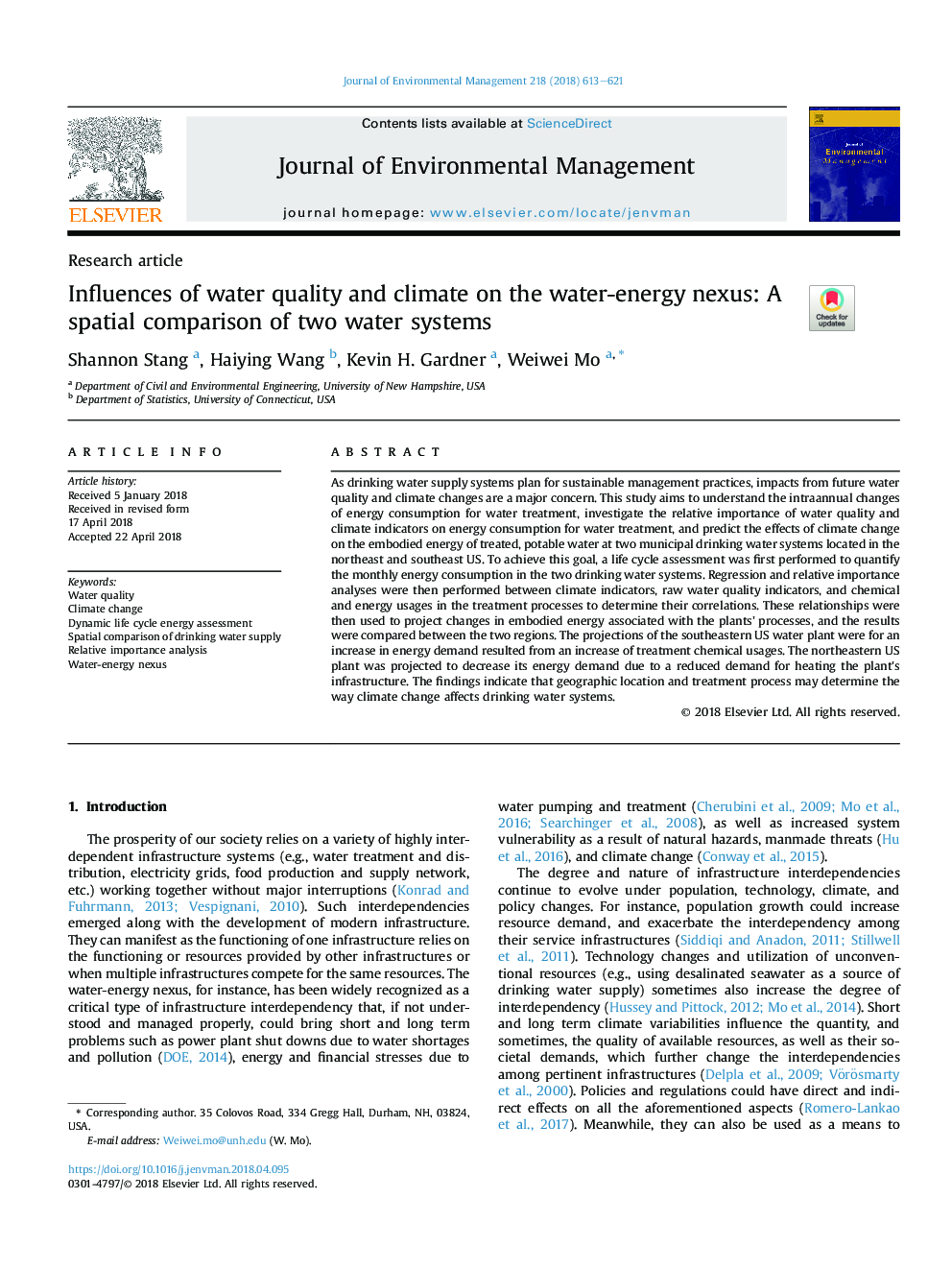| کد مقاله | کد نشریه | سال انتشار | مقاله انگلیسی | نسخه تمام متن |
|---|---|---|---|---|
| 7477165 | 1485200 | 2018 | 9 صفحه PDF | دانلود رایگان |
عنوان انگلیسی مقاله ISI
Influences of water quality and climate on the water-energy nexus: A spatial comparison of two water systems
ترجمه فارسی عنوان
تأثیرات کیفیت آب و آب و هوا بر رابطه آب و انرژی: یک مقایسه فضایی دو سیستم آب
دانلود مقاله + سفارش ترجمه
دانلود مقاله ISI انگلیسی
رایگان برای ایرانیان
کلمات کلیدی
کیفیت آب، تغییر آب و هوا، ارزیابی انرژی دینامیک انرژی، مقایسه فضایی آب آشامیدنی، تجزیه و تحلیل اهمیت نسبی، آب و انرژی نکسوس،
ترجمه چکیده
به عنوان سیستم های تامین آب آشامیدنی برای شیوه های مدیریت پایدار برنامه ریزی شده است، تاثیرات کیفیت آب در آینده و تغییرات آب و هوایی یک نگرانی عمده است. این مطالعه با هدف درک تغییرات سالانه مصرف انرژی برای تصفیه آب، اهمیت نسبی کیفیت آب و شاخص های آب و هوایی بر مصرف انرژی برای تصفیه آب، و پیش بینی اثرات تغییرات آب و هوا بر انرژی تجدید شده آب آشامیدنی و آب آشامیدنی در دو آب آشامیدنی شهری واقع در شمال شرقی و جنوب شرقی ایالات متحده است. برای دستیابی به این هدف، ابتدا برای ارزیابی مصرف انرژی ماهانه در دو سیستم آب آشامیدنی، یک آزمایش چرخه عمر انجام شد. سپس تجزیه و تحلیل رگرسیون و اهمیت نسبی بین شاخص های آب و هوا، شاخص های کیفیت آب خام و کاربردهای شیمیایی و انرژی در فرآیندهای درمان برای تعیین همبستگی آنها انجام شد. سپس این روابط به منظور طراحی تغییرات در انرژی تجدید شده در فرآیند گیاهان مورد استفاده قرار گرفت و نتایج در دو منطقه مقایسه شد. پیش بینی آب گیاه جنوب شرقی ایالات متحده برای افزایش تقاضای انرژی ناشی از افزایش استفاده از مواد شیمیایی درمان بود. نیروگاه شمال شرقی ایالات متحده پیش بینی کرد که تقاضای انرژی خود را به دلیل کاهش تقاضا برای گرم کردن زیرساخت های این نیروگاه کاهش دهد. یافته ها نشان می دهد که مکان جغرافیایی و فرآیند درمان ممکن است تغییرات آب و هوایی را در سیستم های آب آشامیدنی تأثیر بگذارد.
موضوعات مرتبط
مهندسی و علوم پایه
مهندسی انرژی
انرژی های تجدید پذیر، توسعه پایدار و محیط زیست
چکیده انگلیسی
As drinking water supply systems plan for sustainable management practices, impacts from future water quality and climate changes are a major concern. This study aims to understand the intraannual changes of energy consumption for water treatment, investigate the relative importance of water quality and climate indicators on energy consumption for water treatment, and predict the effects of climate change on the embodied energy of treated, potable water at two municipal drinking water systems located in the northeast and southeast US. To achieve this goal, a life cycle assessment was first performed to quantify the monthly energy consumption in the two drinking water systems. Regression and relative importance analyses were then performed between climate indicators, raw water quality indicators, and chemical and energy usages in the treatment processes to determine their correlations. These relationships were then used to project changes in embodied energy associated with the plants' processes, and the results were compared between the two regions. The projections of the southeastern US water plant were for an increase in energy demand resulted from an increase of treatment chemical usages. The northeastern US plant was projected to decrease its energy demand due to a reduced demand for heating the plant's infrastructure. The findings indicate that geographic location and treatment process may determine the way climate change affects drinking water systems.
ناشر
Database: Elsevier - ScienceDirect (ساینس دایرکت)
Journal: Journal of Environmental Management - Volume 218, 15 July 2018, Pages 613-621
Journal: Journal of Environmental Management - Volume 218, 15 July 2018, Pages 613-621
نویسندگان
Shannon Stang, Haiying Wang, Kevin H. Gardner, Weiwei Mo,
